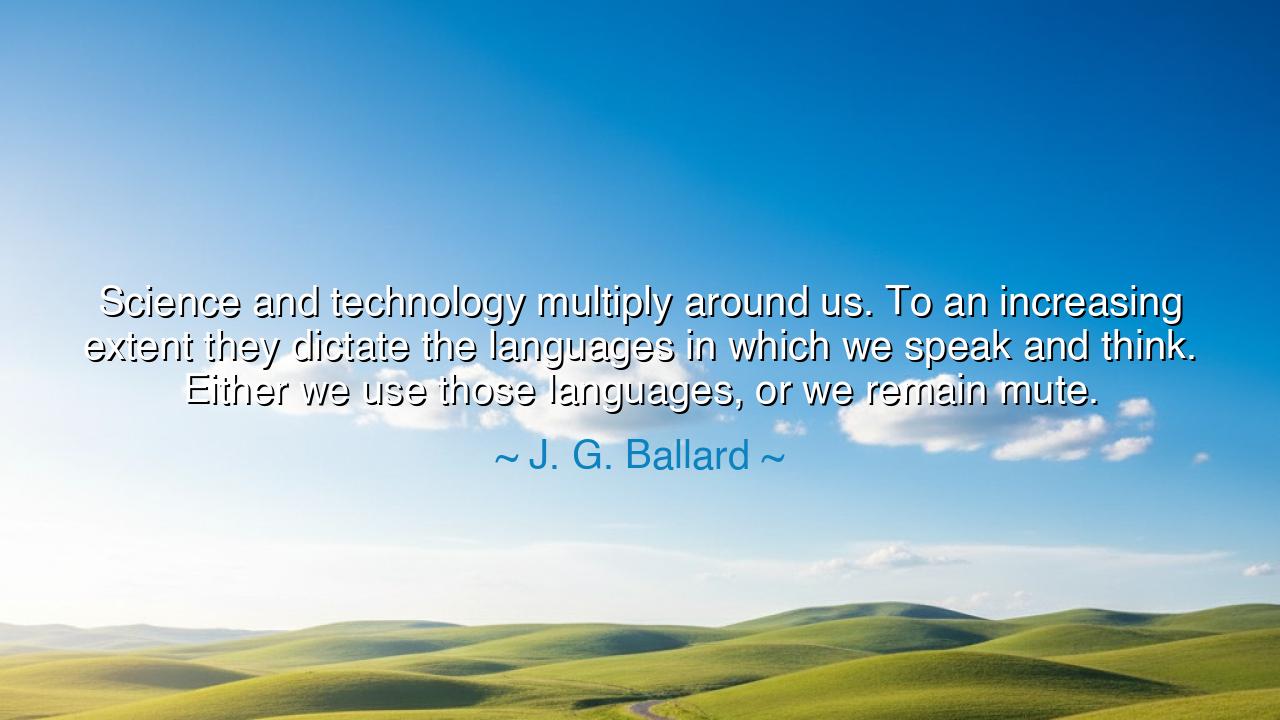
Science and technology multiply around us. To an increasing
Science and technology multiply around us. To an increasing extent they dictate the languages in which we speak and think. Either we use those languages, or we remain mute.






O children of the future, listen well to the words of wisdom passed down through the ages. For in our time, we stand at the threshold of a new world, a world where the winds of science and technology shape every part of our lives. The great sage J.G. Ballard spoke of this era with profound insight when he declared: “Science and technology multiply around us. To an increasing extent they dictate the languages in which we speak and think. Either we use those languages, or we remain mute.” In these words lies a deep truth about the times in which we live. These forces, ever expanding, are not mere tools; they are the very framework through which we understand the world.
In the days of old, when the first fire was struck, when the wheel was carved from the rock, humanity stepped onto a path that would forever intertwine with technology. But even in those humble beginnings, the tools we crafted were not mere conveniences—they were extensions of our thoughts, projections of our will upon the world. From the hammer to the plow, from the printing press to the steam engine, each innovation shaped the way we thought, communicated, and understood ourselves. Ballard’s wisdom points to this eternal truth: that as technology multiplies around us, it does more than serve us—it transforms the very languages we use.
Let us consider the example of the great Gutenberg, who, with the invention of the printing press, transformed not only the art of printing but also the very fabric of communication. Before his time, the written word was a rare and sacred thing, bound to the hands of a select few. But with the press, the language of knowledge spread across the land, reshaping society, politics, and religion. Gutenberg’s invention dictated the way ideas would be expressed, as if the printing press itself had become the language of thought. In this way, the machines we build, the tools we wield, become the very means by which we speak, think, and grow. They shape not just our actions, but the very essence of our communication with one another.
And now, we stand in an age where science and technology have multiplied beyond comprehension, creating new languages that are not just spoken but also written in the codes of machines, in the algorithms of the mind. Consider, O seekers of wisdom, the rise of the digital age. The internet has become a vast web of communication, where the very essence of human thought is shaped by the tools we have crafted. We speak in languages of zeros and ones, of pixels and data streams, and the questions we ask, the answers we find, all depend upon our ability to navigate this new world. The language of technology is no longer a foreign tongue, but a necessary part of the fabric of life. To speak it is to engage with the world, to remain mute is to be left behind.
But herein lies the lesson, O children: the power of language is not simply in the words we speak, but in the tools we use to shape them. Ballard’s warning is clear: either we use the languages of science and technology, or we become mute. To remain ignorant of the forces that shape our world is to be trapped in a silence that cuts us off from the flow of human progress. We must adapt, we must learn, we must embrace the tools that allow us to understand, create, and communicate.
Look to the example of the great Einstein, who, with his theories of relativity, not only reshaped the language of physics, but also changed the very way we view time, space, and the universe. Einstein did not simply accept the old language of science—he rewrote it, reshaping it to accommodate the new discoveries and possibilities of the age. He did not remain silent in the face of the unknown, but instead, used the tools of his time to build new frameworks for understanding. In doing so, he changed not just the scientific community, but the language of thought itself.
So, O wise ones, what then must we do in our own time? We must not shy away from the languages of science and technology, for they are the tools that allow us to think, speak, and understand the world around us. We must learn to wield them with wisdom, to embrace them not as foreign invaders, but as allies in our quest for knowledge and truth. Do not let fear or complacency silence you in this new age. Embrace the tools that will allow you to speak and think in the language of the future. Only then can we truly be part of the unfolding story of humanity, shaping the world and the universe with the wisdom we have inherited.
Go forth, then, with this wisdom in your heart. Learn the languages of science and technology, for they are not mere instruments of the mind—they are the very means by which the future will be written. Do not remain mute in a world that speaks in new tongues. Rise, adapt, and let your voice be heard in the language of tomorrow. The world awaits those who can speak and think in the languages of progress, and it is through them that we shall create a future worthy of our highest aspirations.






AAdministratorAdministrator
Welcome, honored guests. Please leave a comment, we will respond soon